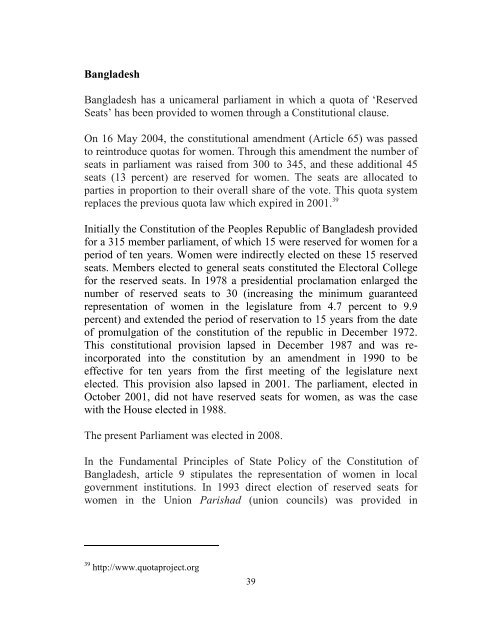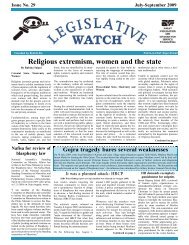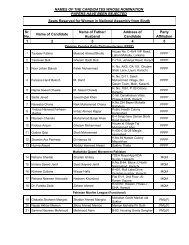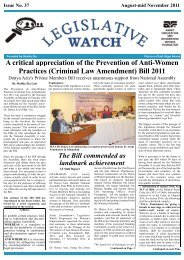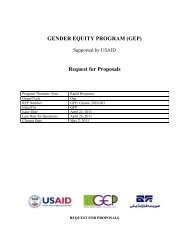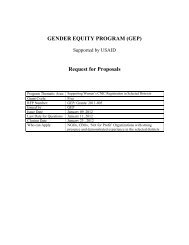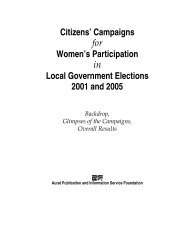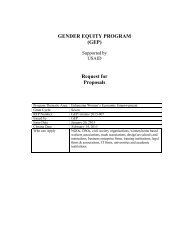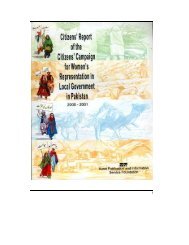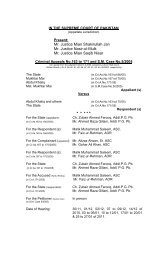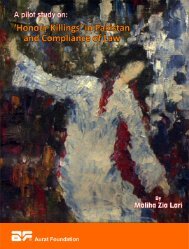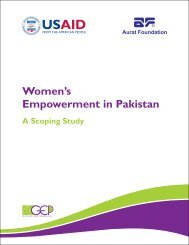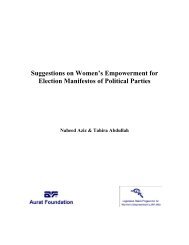Legislative Quotas for Women: A global and ... - Aurat Foundation
Legislative Quotas for Women: A global and ... - Aurat Foundation
Legislative Quotas for Women: A global and ... - Aurat Foundation
- No tags were found...
Create successful ePaper yourself
Turn your PDF publications into a flip-book with our unique Google optimized e-Paper software.
BangladeshBangladesh has a unicameral parliament in which a quota of ‘ReservedSeats’ has been provided to women through a Constitutional clause.On 16 May 2004, the constitutional amendment (Article 65) was passedto reintroduce quotas <strong>for</strong> women. Through this amendment the number ofseats in parliament was raised from 300 to 345, <strong>and</strong> these additional 45seats (13 percent) are reserved <strong>for</strong> women. The seats are allocated toparties in proportion to their overall share of the vote. This quota systemreplaces the previous quota law which expired in 2001. 39Initially the Constitution of the Peoples Republic of Bangladesh provided<strong>for</strong> a 315 member parliament, of which 15 were reserved <strong>for</strong> women <strong>for</strong> aperiod of ten years. <strong>Women</strong> were indirectly elected on these 15 reservedseats. Members elected to general seats constituted the Electoral College<strong>for</strong> the reserved seats. In 1978 a presidential proclamation enlarged thenumber of reserved seats to 30 (increasing the minimum guaranteedrepresentation of women in the legislature from 4.7 percent to 9.9percent) <strong>and</strong> extended the period of reservation to 15 years from the dateof promulgation of the constitution of the republic in December 1972.This constitutional provision lapsed in December 1987 <strong>and</strong> was reincorporatedinto the constitution by an amendment in 1990 to beeffective <strong>for</strong> ten years from the first meeting of the legislature nextelected. This provision also lapsed in 2001. The parliament, elected inOctober 2001, did not have reserved seats <strong>for</strong> women, as was the casewith the House elected in 1988.The present Parliament was elected in 2008.In the Fundamental Principles of State Policy of the Constitution ofBangladesh, article 9 stipulates the representation of women in localgovernment institutions. In 1993 direct election of reserved seats <strong>for</strong>women in the Union Parishad (union councils) was provided in39 http://www.quotaproject.org39


